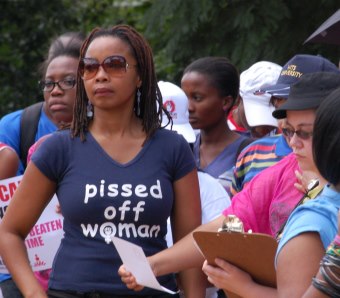
I am a feminist, a WITS Professor, a member of the African feminist and global feminist movements, and a member of the 1in9 Campaign, a feminist campaign – now organization – started to provide support to the woman we call Khwezi, who laid a charge of rape against the man who is now President Zuma, 1in9, an organization which supports other survivors of sexualized violence.
I believed Khwezi in 2006. I STILL believe her.
I am rising today in rage, and I am dancing today in love, metaphorically holding hands with billions of women rising in all parts of the world today to say ENOUGH.
All gender based violence is brutality. ALL of it. ALL the time. It is always an act of war.
I am rising today to say: ENOUGH.
It is time to render violence against women illegitimate on our campus. It is time to stop these acts of war on women’s bodies and psyches. It is time to STOP giving airplay to the excuses that make gender based violence seem harmless, excuses that allow it to stay normal.
STOP RAPE and other violence against women by stopping with the excuses. Enough excuses!
• excuses keep gender based violence: violence against women, girls, boys, gender non-conforming people, queers of all hues in place;
• excuses allow brutal men to violate others with impunity – on this campus, in this city, in this province and country, and across the world;
• excuses enable rape culture, slut shaming, intimate femicide, sexual harassment, sexual trafficking, the forced marriage of girls to men old enough to be their grandfathers;
• excuses say it is fine to blame and punish a survivor for the short skirt she wears, fine to excuse the male professor who sexually harasses his students and colleagues, overly sexualizing them, making inappropriate comments that the woman student is obliged to think of as compliments to stay alive;
• excuses say the white misogynist institutional culture of South African HE institutions is the excellence we should all aspire to. Excuses provides an alibi for systemic violence epistemically, materially, emotionally, financially;
• excuses say violence against Black women is part of generalized Black violence and that brutal men cannot be called the monsters they are when they rape, beat the crap out of their partners and make excuses. ALL men no matter what class, race or religion have patriarchal power and can choose to brutalise and get away with it.
• excuses say only working class Black men are violent and white women and gender non-conforming people don’t have to deal with this from middle and upper class, educated, white men;
• excuses make violence against women possible – they are part of a complicated network that say women are not human, so our pain is generalized, unimportant;
• excuses are the permission we slowly give for violent men to keep women and gender non-conforming people hostage on this campus, in this city, in this country, across the world
ENOUGH excuses. When we make excuses, we become perpetrators – we become the problem.
I rise today because the day has come for the women of the world to redefine what justice means – it is not politician’s speeches, it is not non-sexism at the bottom of stationery, for many of us, it is not in the legal justice system.
I rise today with my sisters of all classes, sexual orientations and nationalities across the world to say we – the majority of the world’s people – are the face of survivors and victims. There is no mystery. The survivors of gendered violence walk the streets all day everywhere, sit next to you in class, are the people you are busy falling in love with, are your sisters, best friend, lover, mother, daughter, your teacher.
I rise in solidarity with all survivors, victims and those who will be brutalized by gender based violence again. I rise and dance to counter the isolation that gender based violence breeds, to counter the shame, to refuse to shoulder the blame and to put an end to the excuses.
I rise to say our bodies are ours and we matter, whether we survive like most of those wounded and walking the planet, or like Nandi Mbizane, taken from her home, who still cannot be found,
or like Anene Booysen we could not survive, or like Khwezi we cannot come home.
I rise because a billion women rising at WITS and campuses across the world, in Kenya, Bangladesh, Ghana, Malaysia, Venezuela and everywhere else can change the world. I rise because in the 7 minutes I have been speaking to you, 16 women have been raped in SA, and many more women in every country in the world. In SA 1in 2 women will be raped at least once in her lifetime. Both will be sexually harassed on a regular basis and may be beaten on top of that.
I rise because it is time for rage. I rise because it is time for justice.
I rise because it is time for love – for myself, for the many women, gender non-conforming people, children who walk with the silent torment that survivors know too well. I rise because my body is mine, all our bodies belong to us and are not just battlegrounds. I rise because I love women and because I choose women. I rise because feminism is the movement that taught me to dance. And because I know that movement CAN, WILL, MUST end this brutality.
We WILL redefine justice when we continue to rise and rise and rise and dance in our own name, in our self-defense and in self-love. The time has come – for love and rage, love for ourselves and rage at the unmarked monsters that brutalize women everywhere.
WOMANDLA!
* Constitution Hill talk was similar, sans WITS parts. Photo: Wits Communications